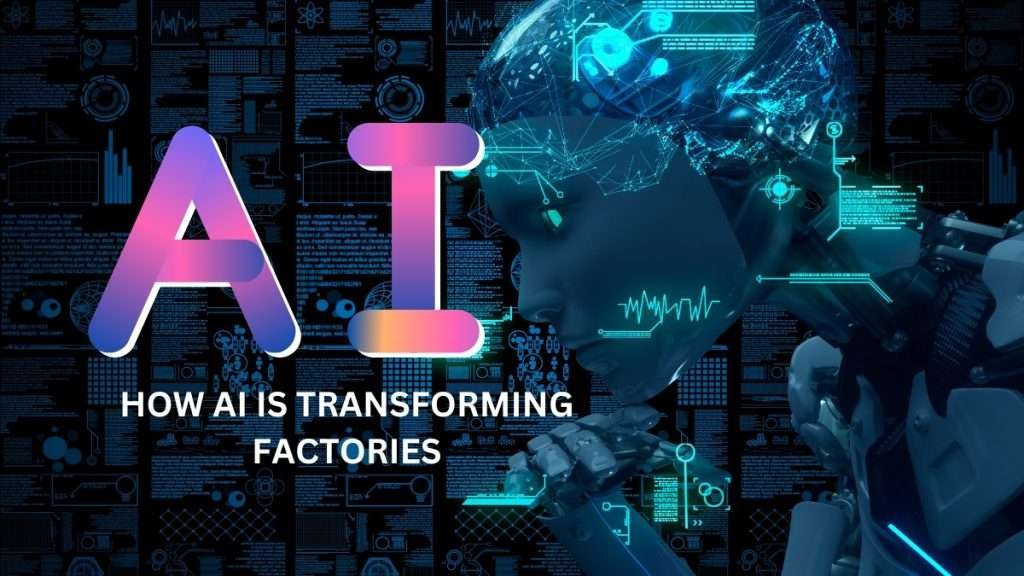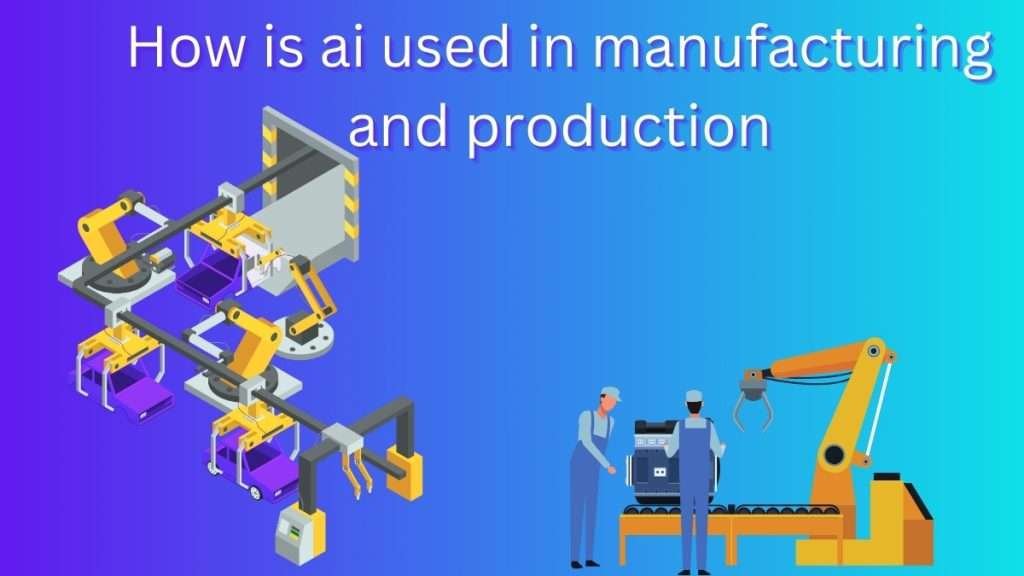Artificial Intelligence (AI) has grow to be an imperative a part of modern-day production and production processes. By integrating AI technology, organizations can reap remarkable ranges of performance, precision, and productiveness. This comprehensive weblog explores how AI is transforming factories, the particular advantages it brings, the packages of AI within the manufacturing enterprise, and addresses the question of whether AI will take over manufacturing.
Benefits of AI in manufacturing
AI gives numerous benefits that revolutionize manufacturing and manufacturing processes. These blessings span various facets of operations, which include performance, fee financial savings, satisfactory manage, and innovation.
1. Enhanced Efficiency and Productivity
AI-powered structures and robots can operate continuously without fatigue, considerably boosting productiveness. Machine mastering algorithms can optimize production schedules, reduce downtime, and streamline operations. By predicting upkeep needs and stopping equipment failures, AI minimizes interruptions, making sure clean production flows.
2. Cost Reduction
AI-driven automation reduces exertions prices by way of coping with repetitive and exertions-extensive tasks. Predictive renovation and smart stock control in addition reduce charges through minimizing surprising breakdowns and overstocking. Additionally, AI can optimize electricity utilization, main to massive savings on utility payments.
3. Improved Quality Control
AI structures can discover defects and inconsistencies with greater accuracy than human inspectors. Machine imaginative and prescient era, for example, uses cameras and AI algorithms to look at products for defects, ensuring better first-rate standards. This outcomes in fewer recalls and higher customer delight.
4. Supply Chain Optimization
AI enhances deliver chain control via predicting demand, optimizing stock tiers, and enhancing logistics. AI algorithms analyze facts from diverse assets, consisting of marketplace traits and historic income, to forecast demand correctly. This facilitates producers keep away from overproduction or stockouts.
5. Enhanced Decision-Making
AI presents treasured insights by means of studying full-size amounts of facts in actual-time. This information-pushed approach enables producers to make informed choices speedy. Predictive analytics can discover capability issues before they emerge as critical, allowing proactive measures to be taken.
6. Innovation and Customization
AI helps innovation by way of permitting the fast prototyping and trying out of latest merchandise. AI-powered layout gear can generate and compare more than one layout iterations, rushing up the improvement procedure. Additionally, AI allows mass customization, allowing manufacturers to tailor merchandise to person customer options without sacrificing efficiency.
How AI is transforming factories

The transformation of factories via Artificial Intelligence (AI) is reshaping the landscape of producing. AI technologies are revolutionizing traditional manufacturing approaches, improving efficiency, productivity, and flexibility. From predictive upkeep to independent robotics, AI is unlocking new opportunities and using unparalleled ranges of innovation. Let’s explore how AI is reworking factories throughout various dimensions.
Smart Manufacturing
AI is powering the transition to clever production, where interconnected structures and wise machines collaborate seamlessly. In clever factories, AI algorithms examine tremendous quantities of facts in real-time to optimize production tactics. These algorithms allow predictive analytics, looking ahead to renovation needs, detecting anomalies, and optimizing useful resource allocation. By integrating AI with the Internet of Things (IoT) sensors and actuators, smart factories achieve better levels of automation, agility, and flexibility.
Predictive Maintenance
One of the most extensive alterations delivered by means of AI is in predictive preservation. Traditional upkeep practices often depend on constant schedules or reactive strategies, leading to both needless downtime or highly-priced breakdowns. AI-pushed predictive upkeep uses system gaining knowledge of algorithms to investigate records from sensors, system performance records, and environmental elements to are expecting whilst machines are probably to fail. By identifying capability problems earlier than they arise, factories can schedule renovation proactively, minimize downtime, and expand the lifespan of system.
Digital Twins
AI-powered digital twins create digital replicas of physical property, techniques, or structures. These digital models allow manufacturers to simulate and optimize operations in a digital environment. By capturing real-time data from IoT sensors and integrating it with AI algorithms, digital twins offer insights into gadget overall performance, manner performance, and product first-rate. Manufacturers can use digital twins to experiment with one-of-a-kind eventualities, become aware of optimization possibilities, and enhance decision-making across the manufacturing unit floor.
Autonomous Robotics
AI-pushed robots are reworking production strategies with the aid of automating repetitive, exertions-extensive tasks. Collaborative robots, or cobots, paintings along human workers, dealing with responsibilities that require precision, speed, or protection precautions. These cobots are equipped with AI algorithms that allow them to research from their environment, adapt to changing conditions, and collaborate correctly with humans. Autonomous cell robots navigate manufacturing facility flooring autonomously, transporting substances, additives, and finished merchandise between workstations, warehouses, and transport docks.
Quality Assurance
AI complements great guarantee techniques by using automating inspections and disorder detection. Machine vision structures geared up with AI algorithms analyze snap shots and video streams to discover defects, deviations, or anomalies in products. These systems can look at merchandise at high speeds and with high accuracy, making sure regular best standards and decreasing the chance of faulty products accomplishing clients. AI-pushed excellent warranty allows producers to improve product great, lessen waste, and decorate customer delight.
Supply Chain Optimization
AI optimizes deliver chain control by way of supplying real-time visibility, predictive analytics, and decision guide. AI algorithms examine information from providers, production facilities, distribution networks, and marketplace call for to optimize stock levels, reduce lead instances, and enhance delivery accuracy. By awaiting demand fluctuations, deliver chain disruptions, and inventory imbalances, AI enables manufacturers to make knowledgeable decisions, mitigate dangers, and enhance normal deliver chain performance.
AI is remodeling factories by way of permitting smarter, more green, and extra bendy manufacturing procedures. From predictive protection and digital twins to autonomous robotics and satisfactory warranty, AI technology are revolutionizing each element of manufacturing operations. The integration of AI with IoT, robotics, and statistics analytics is unlocking new possibilities and driving unheard of stages of innovation in the manufacturing industry. As AI keeps to adapt, factories becomes an increasing number of shrewd, adaptive, and responsive to changing marketplace needs and technological improvements.

How is ai used in manufacturing and production
The transformation of factories thru AI involves integrating superior technologies into every thing of producing, from layout and production to quality manage and logistics.
- Smart Manufacturing: Smart manufacturing leverages AI, the Internet of Things (IoT), and superior robotics to create notably automatic and interconnected production structures. In smart factories, machines talk with every different and make self reliant decisions based on real-time records. This results in more agile and bendy production tactics.
- Predictive Maintenance:One of the maximum substantial alterations AI brings to factories is predictive upkeep. Traditional maintenance schedules are often based on fixed intervals, that could lead to both useless maintenance or surprising breakdowns. AI-driven predictive renovation uses records from sensors and machine studying algorithms to predict when gadget is possibly to fail. This allows protection to be carried out most effective while wanted, decreasing downtime and extending the lifespan of equipment.
- Digital Twins: Digital twins are virtual replicas of bodily assets, strategies, or structures. AI-powered digital twins permit manufacturers to simulate and examine their operations in a digital surroundings. This enables in figuring out capacity issues, optimizing overall performance, and planning renovation sports with out disrupting actual production.
- Autonomous Robots: AI-driven robots are revolutionizing manufacturing facility flooring. Collaborative robots, or cobots, work along human people, managing responsibilities which might be dangerous, repetitive, or require precision. These robots can study from their surroundings and adapt to new responsibilities, growing flexibility and performance in production approaches.
- Quality Assurance:AI complements fine warranty procedures by automating inspections and defect detection. Machine imaginative and prescient structures prepared with AI algorithms can check out merchandise at high speeds, figuring out defects that is probably overlooked with the aid of human inspectors. This guarantees regular product nice and decreases waste.
Will AI take over manufacturing?
The question of whether or not AI will take over production is a complicated one which calls for consideration of various factors. While AI is absolutely transforming the producing enterprise, it is not going to completely replace human people.
Instead, AI is predicted to enhance human abilties and create new opportunities for collaboration. AI-pushed automation streamlines repetitive obligations, enhances productivity, and improves efficiency in manufacturing processes. However, human people convey unique talents which include creativity, trouble-fixing, and adaptableness which are tough for AI to replicate.
AI is probable to convert production jobs rather than get rid of them outright. Some roles may additionally become out of date due to automation, but new roles will emerge that require unique abilities, such as managing AI systems, deciphering information, and overseeing complex techniques. Human people will play a important function in supervising and dealing with AI systems, ensuring their effectiveness and ethical use.
Furthermore, the future of producing is possibly to contain greater collaboration among humans and machines. Collaborative robots (cobots) are designed to work alongside human workers, improving productivity and protection. Human people will stay crucial for responsibilities that require empathy, instinct, and decision-making based totally on contextual knowledge.
Overall, whilst AI will preserve to play an more and more essential position in manufacturing, it’s miles unlikely to completely take over. Instead, AI will supplement human workers, enabling them to awareness on higher-fee responsibilities and riding innovation inside the enterprise.
Summing Up
AI is revolutionizing the producing and production enterprise via enhancing efficiency, reducing expenses, improving best, and riding innovation. The integration of AI technology into factories is transforming each factor of operations, from predictive upkeep and first-rate manage to deliver chain optimization and human-robotic collaboration. While AI is unlikely to absolutely update human people, it’ll augment their skills and create new possibilities for collaboration. The destiny of producing will involve extra synergy between humans and machines, leading to a more efficient, innovative, and sustainable enterprise.







